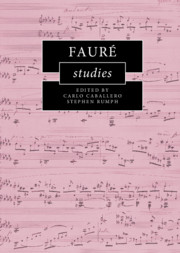Book contents
- Fauré Studies
- Cambridge Composer Studies
- Fauré Studies
- Copyright page
- Dedication
- Contents
- Figures
- Tables
- Music Examples
- Contributors
- Acknowledgments
- Looking Back on a Journey
- 1 Patrons and Society
- 2 Keys to the Ineffable in Fauré
- 3 Fauré as Student and Teacher of Harmony
- 4 Romancing the mélodie, or Generic Play in the Early Hugo Settings
- 5 Lux aeterna
- 6 From Homer’s Banquet to Fauchois’ Feast
- 7 Orchestral Melody in Pénélope
- 8 Fauré the Practical Interpreter
- 9 Fauré, Orientalism, and Le voile du bonheur
- 10 Jankélévitch, Fauré, and the Thirteenth Nocturne
- Index
6 - From Homer’s Banquet to Fauchois’ Feast
The Odyssey’s Odyssey
Published online by Cambridge University Press: 17 April 2021
- Fauré Studies
- Cambridge Composer Studies
- Fauré Studies
- Copyright page
- Dedication
- Contents
- Figures
- Tables
- Music Examples
- Contributors
- Acknowledgments
- Looking Back on a Journey
- 1 Patrons and Society
- 2 Keys to the Ineffable in Fauré
- 3 Fauré as Student and Teacher of Harmony
- 4 Romancing the mélodie, or Generic Play in the Early Hugo Settings
- 5 Lux aeterna
- 6 From Homer’s Banquet to Fauchois’ Feast
- 7 Orchestral Melody in Pénélope
- 8 Fauré the Practical Interpreter
- 9 Fauré, Orientalism, and Le voile du bonheur
- 10 Jankélévitch, Fauré, and the Thirteenth Nocturne
- Index
Summary
The tragedian Aeschylus is said to have called his plays slices from Homer’s banquet, by which he presumably meant slices from what Homer had left behind on the table.1 It is much easier, as Aeschylus knew (and so famously did), to develop stories that Homer probably knew but did not tell or (as Roman poets eventually did) to weave new stories using Homeric techniques than it is to rework in an artistically effective way what Homer had already done in the Iliad and Odyssey. A change of genre may certainly make that task easier, and the aim of this essay is to look specifically at what happens when a slice from Homer’s own platter becomes a libretto and then, in turn, a performable opera. The specific process in question involves the self-styled poème lyrique of the prolific dramatist, librettist, and actor René Fauchois and Pénélope, the opera made from it by Gabriel Fauré.
Keywords
- Type
- Chapter
- Information
- Fauré Studies , pp. 134 - 151Publisher: Cambridge University PressPrint publication year: 2021

